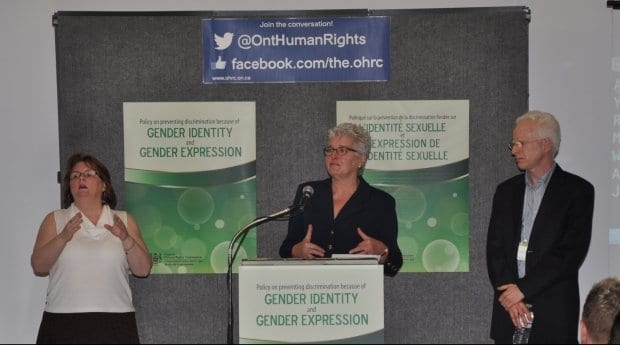In what may prove to be a landmark decision for trans rights in Ontario, a tribunal ruled May 30 that the ouster of three transgender women and their boss from a London farmers’ market was discriminatory.
The case is the first closed under Toby’s Act, which in 2012 added gender identity and gender expression to the Ontario Human Rights Code as prohibited grounds of discrimination.
For the trans community, the Ontario Human Rights Tribunal ruling is just one of many much-needed triumphs. “We’ve got so many battles that we’re fighting at all times that, when we get one, we pause and enjoy the victory,” says Michelle Boyce, of London’s Alphabet Community Centre. “But we have so many more fronts to battle.”
Despite the now explicit legal recognition of trans rights, and the policy launched by the Ontario Human Rights Commision in April to clarify the law, the fight is still young. In many ways, the hardest work is still to be done in implementing workplace-training initiatives and further defining who falls under the gender identity and expression definitions. The London market case is just the beginning.
The owner of the Trails End market, Edward Kikkert, had alleged that in September 2011 the employees at Karen Clarke-McIlwain’s candle booth were too scantily dressed for his “family” market. Clarke-McIlwain alleged she was given an ultimatum: remove the “guys dressed up as girls” from her booth or remove her business from the market. She opted to leave rather than be party to bigotry, she said at the time. Then she filed a human rights complaint.
The tribunal in May found Kikkert’s actions discriminatory and said that “transgendered people should be recognized and treated as the gender they live in, whether or not they have undergone surgery.”
As part of the ruling, Kikkert must pay $40,000 in damages, take the Human Rights Commission’s online training course, and train his staff.
Though trans people have been protected under Ontario’s Human Rights Code for some 15 years, it was always under the categories of disability and sex, which wasn’t accurate, commission head Barbara Hall says.
“When that was the only thing available, some people were prepared to take advantage of that,” Hall says. But the problems ran deeper, with trans complaints filed under categories that didn’t fit. “Many people didn’t know it existed. Trans people themselves didn’t know they were protected, and all the people with obligations or responsibilities didn’t know.”
Boyce welcomes the Ontario government’s 2012 act to prohibit discrimination specifically on the basis of gender identity and expression. “Visibility is crucial,” she says. “It’s right there. They can’t miss it.”
Still, the visibility that the new law and now the Commission’s policy clarifying the law bring were a long time coming, Boyce says.“I think what took so long was ignorance of society about this community,” Hall says.
The policy has not come without its detractors. Christina Blizzard, of the Toronto Sun, came out against Toby’s Law in the wake of news that a man posed as transgender to get into a women’s washroom facility. “This law must be changed,” Blizzard wrote in February. “We cannot let political correctness trump common sense, human dignity — and the safety of women.”
Opposition lies even within the gay community, notes Boyce, who recalls a time in London when trans people were thrown out of a Pride dance. That has since changed, with trans people on Pride boards across the country, but more needs to be done, she says.
“There’s a huge push-back by the GLB community, in particular the G community, whereby they don’t feel that trans is under the umbrella,” she says. “They think that the world revolves around them, and I mean, you don’t have to go far to see the comments on an Xtra blog post before somebody is bringing up ‘This isn’t a gay issue.’”
A recent report by the Canadian AIDS Society found that as much as 85 percent of trans responders had been harassed for being trans. For Loralee Gillis, research and policy coordinator at Rainbow Health Ontario and one of the complainants in the Pussy Palace case in 2000, the commission’s new policy is a necessary but small step to help decrease those numbers.
“This is just the tip of the iceberg,” Gillis says. “This is about preventing discrimination. That’s just the beginning. We want to live in a world where trans people are embraced and celebrated.”

 Why you can trust Xtra
Why you can trust Xtra


